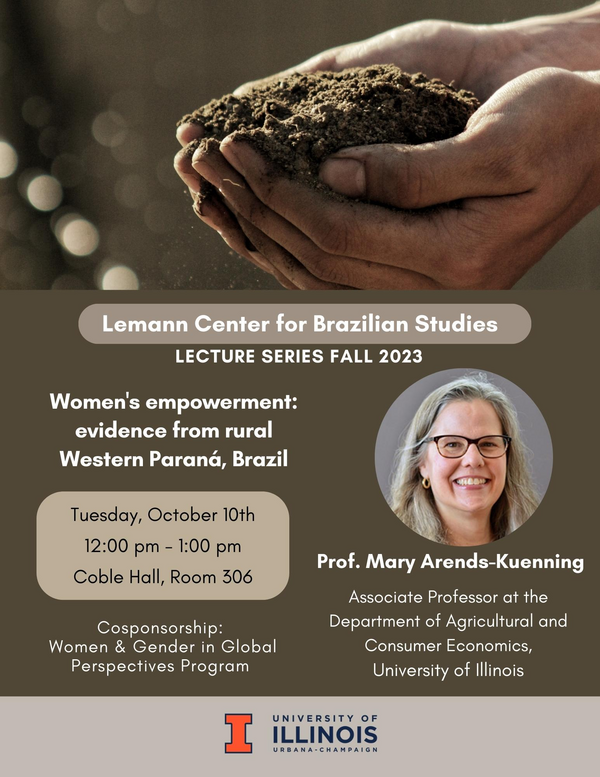
Lemann Lecture Series | Mary Arends-Kuenning | Women's empowerment: evidence from rural Western Paraná, Brazil
- Event Type
- Lecture
- Sponsor
- Lemann Center for Brazilian Studies, co-sponsored by Women and Gender in Global Perspectives Program
- Location
- 306 Coble Hall, 801 S Wright Street
- Date
- Oct 10, 2023 12:00 - 1:00 pm
- Speaker
- Mary Arends
- Contact
- Lemann Center
- lemann@illinois.edu
- Views
- 128
- Originating Calendar
- Center for the Study of Global Gender Equity
The Women’s Empowerment in Agriculture Index (WEAI) has been applied widely in low-income settings, but rarely in middle-income settings such as Southern Brazil. This article explores the participation of women in agriculture in the western region of the state of Paraná, Brazil. We measured the empowerment of members of an agricultural cooperative operating in this region and analyzed whether this empowerment is related to participation in activities of the cooperative’s Women's Leadership Development Program (WLDP). We adapt the Abbreviated WEAI (A-WEAI) to reflect women’s empowerment in this setting. Women who participated in WLDP scored at the high level on our A-WEAI, whereas women who did not participate had a medium score. Women's empowerment is associated with WLDP participation, participation in non-gender-specific training offered to cooperative members, an income range of 9.1 to 12 minimum wages, and age. The training provided by the Cooperative might be an effective way to develop human and social capital, promote the empowerment of male and female participants, and bridge the gender gap.
Mary Arends-Kuenning is Acting Associate Dean of International Programs in the College of Agricultural, Consumer, and Environmental Sciences, Associate Professor in the Department of Agricultural and Consumer Economics, and former Interim Director of the Lemann Center for Brazilian Studies at the University of Illinois. She is an economic demographer who focuses on household decisions. Her research areas include children’s schooling and child labor, household consumption, family planning, and international migration. She examines the implications of household decisions for household members’ present and future well-being. Her work has been published in World Development, Demography, and Journal of Environmental Economics and Management, among other journals and is widely cited by other researchers and policymakers.